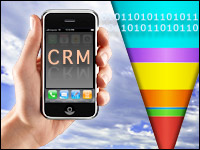
If you think mobile CRM has been popular to date, you ain’t seen nothing yet.
There will be an eye-popping 500 percent increase in the number of mobile CRM apps available for download on app stores between now and 2014, Gartner predicted. That number is expected to grow to more than 1,200 by next year from 200 or so today.
What’s driving this anticipated growth surge?
It’s true that mobile use in general is surging, but that doesn’t fully explain the CRM phenom. Digging a little deeper, there are some interesting insights to unearth that are specific to the CRM story.
Following is a list of reasons underlying the sudden popularity of mobile CRM. Some of them suggest that it may even outshine its desktop counterpart in the foreseeable future.
It’s Convenient
Mobile CRM means flexibility and adaptability, David Coulson, account manager at Bottle Rocket Apps, told CRM Buyer.
“If you’re out with a client, you can do actionable work on the fly instead of pulling out a laptop or scribbling on a napkin and having to do it later,” he said.
It’s Flexible and Malleable
Mobility has more to do with where the user is, not what the device type is, Mitch Lieberman, managing partner of DRI, told CRM Buyer. “We see sales people open a computer in their car with a mobile hotspot, and we see sales people use their smartphone at their desk to make a call. Which is which?”
In fact, the definition of “mobile,” as understood in the CRM industry, is outdated if not outright wrong, Lieberman argued.
The way the industry and technology are trending, the more accurate term would be “context integration,” he suggested — “sending the right information to the right person on the right device at the right time.”
Functional Parity With the Desktop
Almost anything desktop CRM can do, mobile CRM can do as well, said Kevin Sangsland, vice president with Airfoil.
“Mobile CRM offers virtually the same experiences on the mobile phone that could be experienced on the desktop, but can also create engagement beyond that use environment,” he told CRM Buyer. “It’s better because it is capable of a more holistic reach.”
It Engenders Loyalty
People have personal relationships with their mobile devices, Bottle Rocket Apps’ Coulson said. “The features and apps we use are a reflection of how we live.”
User-friendly mobile CRM is able to insert itself into this environment.
“A mobile device enables geolocation capabilities,” noted Coulson. “When you enter your favorite store, your store’s app tells you about specials because it knows you’re there.”
The growing trend of mobile CRM gamification is also nudging this trend along, he said. “On most CRM loyalty apps, the first thing you see is your status and what you need to do to move up to another level or get that free drink. It can create a sense of urgency.”
It Brings a Value-Add
Unlike desktop CRM, mobile CRM was designed to be sparse and streamlined, and to keep the number of clicks or finger taps to a minimum.
In short, it was designed after the developer answered the question, “why does this need to be built?” said Alex Bratton, CEO and chief geek of Lextech.
“Only when you can answer the question ‘why’ when designing a mobile app,” he told CRM Buyer, “will the app deliver the valuable user experience needed for adoption.”

























































Of course, CRM for mobile devices is needed. When everything’s on our mobile, why not the CRM?
mobile application lets you access your CRM information anytime, anywhere from your mobile phones. Real Time Access.
One of the main drivers in mobile CRM is the culture of multiple devices. If you have your email and music on your desktop, iPad and iPhone, why can’t your CRM work seamlessly across multiple platforms?
So you’ll see many more CRM systems made available cross-platform in the next 12 months.
John Paterson
http://www.reallysimplesystems.com
Thanks for the information, Erika! In today’s technologically progressive market environment, the ability to quickly and easily input data has become a necessary ability of social CRM platforms. Office suites offering SCRM capabilities have introduced mobile apps necessary for every business that wishes to stay competitive and aware of consumer trends. Furthermore, a mobile app can substantially change preferences for adoption, due to its accessibility.